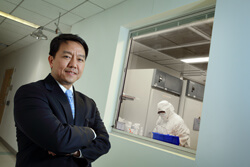
HeadWay
May 1, 2014

“Despite the best standard of treatment,” says researcher and otolaryngologist Young Kim, “the cure rate is still not sufficient.”
Seeking to turn that around, Kim is researching a one-two punch that would turn off the cancer’s ability to evade the immune system and also enhance the immune system’s ability to fight cancer.
The first part of Kim’s strategy centers on an antibody therapy that got its start at Johns Hopkins in the labs of Drew Pardoll, Suzanne Topalian and Lieping Chen, an immunobiologist now at Yale University. The therapy targets a signaling pathway involving a protein present in T cells called programmed death-1 (PD-1). This protein normally plays a role in keeping T cell function in check, preventing these immune cells from attacking normal cells. One mechanism that cancer cells use to hide from immune recognition is expressing a protein called programmed death ligand-1 (PD-L1), which binds to PD-1 and prevents T cells from responding as they normally would to kill cancer cells.
Recent clinical trials of an anti-PD-1 antibody in lung cancer patients at Johns Hopkins and elsewhere showed that it boosted T cell response enough to allow the immune system to completely eradicate some cancers—a durable response that hasn’t been seen with many other therapies.
Kim says that these findings have instilled a tremendous sense of optimism in researchers across the oncology spectrum. But there’s just one catch—the number of patients in this clinical trial was still relatively small.
To help boost these numbers, Kim and his colleagues are working on a therapy that will combine anti-PD-1 antibodies and a cancer vaccine he’s developing in his lab. The vaccine brings together tumor antigen with a novel adjuvant that radically increases the number of activated antigen-presenting cells.
Kim hopes to eventually bring together anti-PD-1 antibodies with his vaccine, a recipe that he believes has the potential to eliminate cancer in even more patients and significantly increase the cure rate for head and neck squamous cell carcinomas.
“These are patients who have been through the wringer—big surgeries, radiation, chemotherapy—and their cancer keeps coming back,” Kim says. “For the first time, there’s real hope for these patients.”
For information: 443-997-6467

